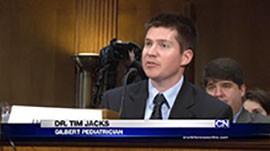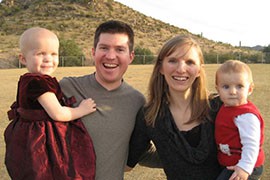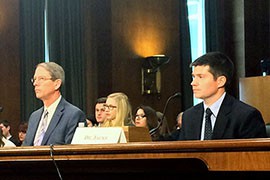Cronkite News has moved to a new home at cronkitenews.azpbs.org. Use this site to search archives from 2011 to May 2015. You can search the new site for current stories.
Gilbert doctor’s push for vaccinations is personal and professional
WASHINGTON – Gilbert pediatrician Tim Jacks was in Washington Tuesday to testify on the importance of vaccination, but he told senators that he was there not as a doctor but as a father.
Jacks’ two children cannot be vaccinated – one is too young and one is weakened by leukemia – and are now in quarantine to see if they show symptoms of measles after being exposed to a measles-infected patient at a clinic recently.
The best protection for people like his children, Jacks said in testimony to the Senate Health, Education, Labor and Pensions Committee, is for others around them to be vaccinated.
“As immunization rates drop, herd immunity starts to break down. And this herd immunity is the only thing protecting my two young children from being exposed to measles or whatever the next problem is,” Jacks testified.
Jacks was part of a panel of doctors speaking before a largely supportive committee on the necessity of vaccines after a measles outbreak in California that has since spread to six other states. The Centers for Disease Control and Prevention reported last week that 114 people had been infected as a result, including seven in Arizona.
Many of the panelists pointed to what they called unfounded fears about the safety of vaccines as the reason for an increase in the number of parents who are choosing not to immunize their kids. That, in turn, has led to the spread of illnesses, like measles, that were thought to be eradicated in the U.S.
That trend has been seen in Arizona, where the number of vaccination exemption due to personal belief has risen from 1.6 percent a decade ago to 3.9 percent in 2012-2013, according to the Arizona Department of Health Services.
“Once the fear is out there it takes a lot to reassure, it takes a long time before that leaves the memory of somebody,” Jacks said after his testimony.
Sen. Michael Bennet, D-Colo., said those trying to encourage vaccinations appear to have “been victimized by two things.”
“One, a generation that has not experienced these diseases because of vaccines and have lost sight of what they look like,” Bennet said at Tuesday’s hearing. “And … the unedited content on the Internet that people, I guess more affluent families, are reading.”
As a pediatrician, Jacks said he strongly encourages all of his patients to get the regular regimen of vaccinations. Despite the grief it has caused his family, however, he also said he still believes parents should have the ability to make their own choices about vaccinating their children – but he does think it should be harder for parents to opt out.
The problem with allowing people to choose not to be immunized, as Jacks noted, is that such choices affect other people as well.
That was the case for his family. After his daughter’s regular visit to a clinic for her leukemia on a Wednesday, the clinic called the following Sunday to say that Jacks, his daughter, his son and his wife had all been exposed to measles due to another patient.
Because of their lack of immunity, Jacks’ children had to return to the hospital for an emergency shot of measles anti-bodies. They now must wait to see if the children develop symptoms, which they have not yet.
Since the ordeal began, Jacks’ blog postings on the topic have gained a national audience allowing him a larger platform from which to calm parents’ fears about vaccines that might cause them to opt out of immunizing their children.
“My hope is that we can prevent some families from going through the same thing that we’ve gone through these past few weeks,” he said. “Prevention is simple. Vaccinate.”











